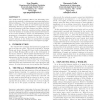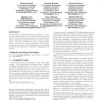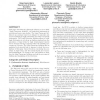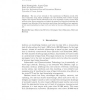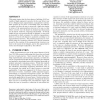ICAIL
2007
ACM
15 years 3 months ago
2007
ACM
The “small world”-paradigm offers a new interesting viewpoint for the analysis of contemporary legal networks and artificial intelligence. This topological approach sheds fu...
105
click to vote
ICAIL
2007
ACM
15 years 3 months ago
2007
ACM
Documentation is essential to daily legal practice. On-line access is current practice. The conditions imposed by an information service provider with respect to access and use of...
ICAIL
2007
ACM
15 years 3 months ago
2007
ACM
This paper describes the philosophy behind our tool called “Legal Taxonomy Syllabus”, the analytical instruments it provides and some case studies. The Legal Taxonomy Syllabus...
127
click to vote
ICAIL
2007
ACM
15 years 3 months ago
2007
ACM
It is the concern of the author to arrange cogitations and experiences she gained by collaborating in relevant international project works, by conducting scientific studies regard...
102
click to vote
ICAIL
2007
ACM
15 years 3 months ago
2007
ACM
The aim of our research is the improvement of Boolean search with query expansion using lexical ontologies and user feedback. User studies strongly suggest that standard search tec...
117
click to vote
ICAIL
2007
ACM
15 years 6 months ago
2007
ACM
In this paper we describe a legal core ontology that is part of a generic architecture for legal knowledge systems, which will enable the interchange of knowledge between existing ...
110
click to vote
ICAIL
2007
ACM
15 years 6 months ago
2007
ACM
Ontologies in a legal expert system must be processed to suit all possible user cases within the field of law of the system. From the logical premises of a deductive system of expr...
104
click to vote
ICAIL
2007
ACM
15 years 6 months ago
2007
ACM
The emergence of digital dossiers in Courts of Law presents new opportunities to streamline the criminal prosecution chain. This papers proposes the use of agent technology to sup...
ICAIL
2007
ACM
15 years 6 months ago
2007
ACM
109
click to vote
ICAIL
2007
ACM
15 years 6 months ago
2007
ACM
Argumentation is modelled as a game where the payoffs are measured in terms of the probability that the claimed conclusion is, or is not, defeasibly provable, given a history of a...
